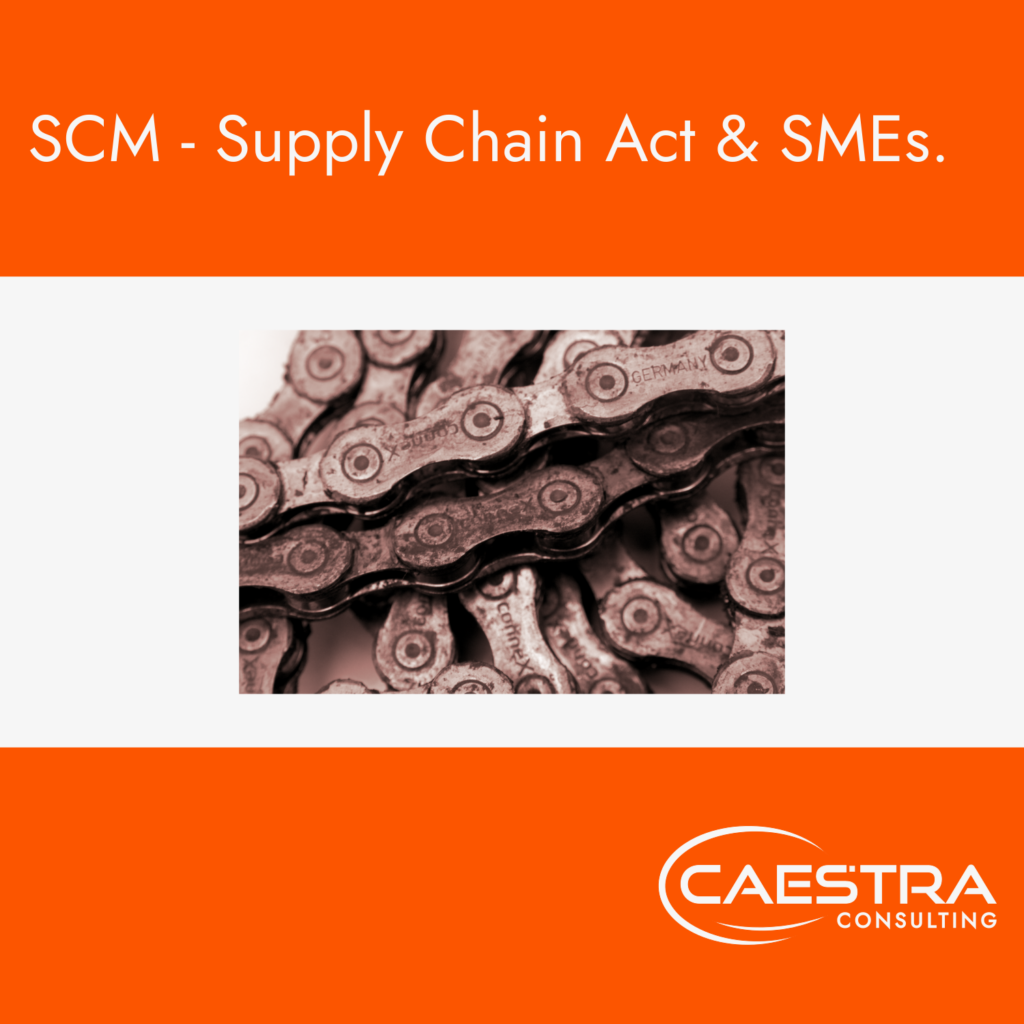Put people at the center, let technology be your partner.
The Supply Chain Act – Why SMEs Should Take a Look at the Regulations of this Still Young Law in Germany.

Then you may belong to those companies that have not yet been or are not currently covered by the scope of the Supply Chain Act, which has been in effect since the beginning of 2023.
The law aims to encourage companies in Germany to contribute to improving the global human rights situation and to socially shape the ongoing globalization of the world economy (National Action Plan Business and Human Rights).
The current regulations, in simplified terms, oblige large companies with at least 3,000 employees, and from 2024 with at least 1,000 employees, to systematically record, assess, and manage their own supply chains regarding potential risks related to human rights violations or negative environmental impacts, with an annual reporting obligation to the Federal Office for Economic Affairs and Export Control (BAFA).
In the context of the law, a supply chain includes all steps, both domestic and international, necessary for the production of products and the provision of services of the respective company – from the extraction of raw materials to delivery to the end customer.
Even from the initial information, logical indications arise as to why SMEs could be affected by the new law. Whether you send cleaning staff to a corporate headquarters or spare parts to a major customer – all of you become part of a supply chain subject to the regulations of the Supply Chain Act as soon as your customer meets the criteria for the mandatory application of the law.
While SMEs are not obligated by the law itself, your large customer may ask you to cooperate in fulfilling its own due diligence obligations under certain circumstances. This will be the case whenever you have been identified by your customer as a potential risk in their own supply chain, and you are actively involved in the recording, assessment, and management of your own risk potential.
Although the law requires large companies to differentiate between low-risk and high-risk suppliers and demands appropriateness in implementing the requirements, in practice, it is often operated on the principle of “more is better” – partly due to lack of experience in dealing with the new law, partly for simplification and standardization of the prescribed systematic approach following the further principle of “same process for all suppliers.”
In our practice, we frequently receive calls from uncertain SME customers facing sometimes absurd demands from their large customers. These demands range from sensible and necessary requests for cooperation in determining their own risk potential in the form of audits or questionnaires to required disclosures of your sources, including the agreed-upon conditions and terms.
Here is a brief overview of justified and unjustified demands from your large customers in connection with the Supply Chain Act. Since we are neither authorized nor interested in providing you with potentially incorrect legal advice, we refer exclusively to BAFA publications at this point and expressly point out that the following lines do not constitute legal advice. You can find the link to BAFA publications here:
Justified demands on SMEs:
Unjustified demands on SMEs:
The BAFA generally recommends seeking individual legal advice when in doubt. From our perspective, this approach is appropriate whenever a direct connection between the requested information and the necessary information to fulfill the legal purpose cannot be established. In case of doubt, refuse to disclose this data, especially if it concerns trade secrets or legally protected data, such as personal data. Also, in case of doubt, refuse to sign generalized clauses or clauses that cannot be reasonably expected from you given your own capabilities.
Further recommendations based on BAFA publications:
Even though the Supply Chain Act currently only obliges large companies and places great emphasis on appropriateness and the individual capacity of involved third parties, a clear trend is emerging that aligns the standards and protected legal interests in line with the law to become the norms of everyday business for all parties involved.
Therefore, the new Supply Chain Act represents a logical consequence of the ongoing shift in values that has been taking place for years, permeating all layers of society and public life.
It might be challenging for individual companies or corporate groups to permanently isolate themselves from these trends. This also applies to SMEs. So why not create something today that will increase your value tomorrow.
If you have questions about the Supply Chain Act, feel free to reach out to us!
Finally, here’s an overview of which human rights and environmental aspects have special significance according to the LkSG:
Human Rights
Environmental aspects
Wir sprechen Deutsch / Nous parlons Français / Wij spreken Nederlands
© Caestra Consulting
All rights reserved